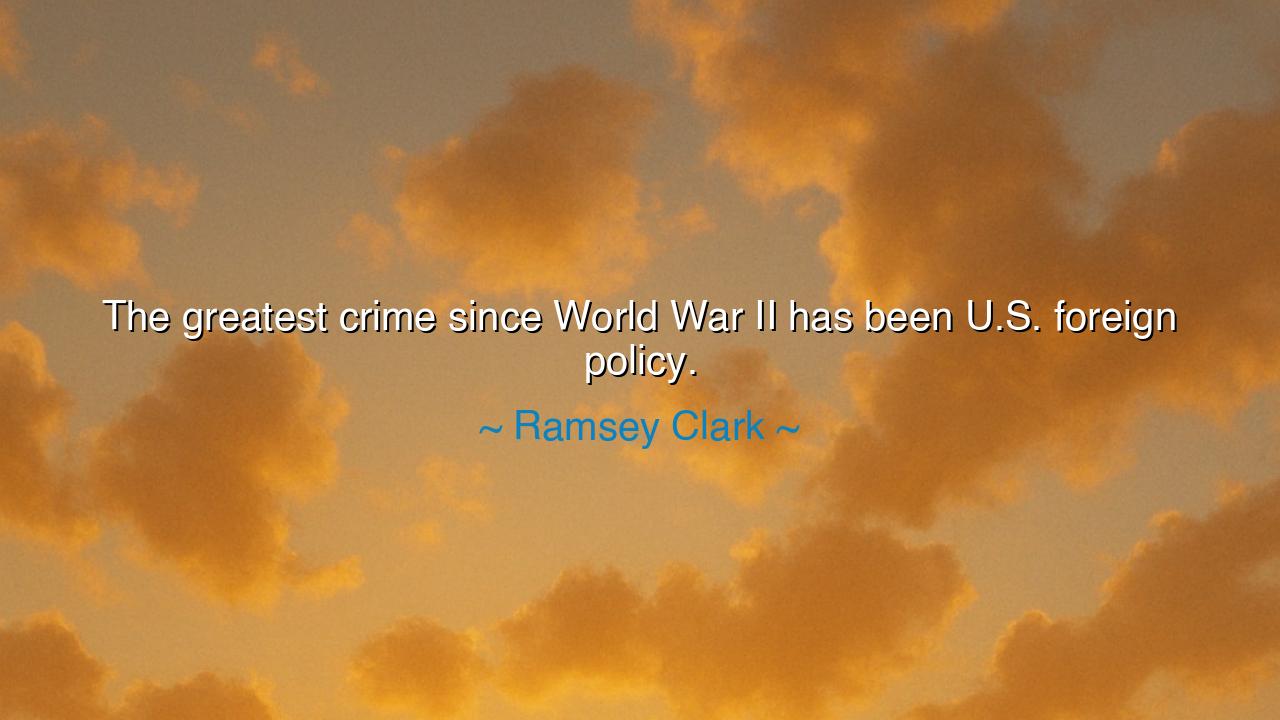
The greatest crime since World War II has been U.S. foreign






Hear the fiery judgment of Ramsey Clark, former Attorney General of the United States, who declared: “The greatest crime since World War II has been U.S. foreign policy.” These words, sharp as a sword, pierce through the veils of pride and power. They are not spoken lightly, for they accuse a mighty nation not of error alone, but of crime—actions that inflicted suffering upon peoples far beyond its shores. They ring with the voice of one who served at the heart of government, yet dared to stand against its deeds.
The origin of this declaration lies in Clark’s long life of dissent. Having witnessed the rise of America as a global superpower after World War II, he saw how its might was wielded not always for justice, but often for domination. From Vietnam, where jungles burned under napalm, to Chile, where elected leaders were overthrown in covert plots, to the Middle East, where wars carved wounds that still bleed—Clark named these not as unfortunate mistakes, but as deliberate acts of policy that brought ruin to nations and misery to millions. His words condemn not a single war, but the pattern of violence cloaked in rhetoric of freedom.
The meaning of Clark’s words is both searing and sobering. He teaches that power, unrestrained by conscience, becomes the greatest crime of all. For when a nation claims the right to police the world, to topple governments, to wage endless wars in the name of security or democracy, it often leaves behind only ashes and resentment. His accusation is not against the American people, but against the machinery of policy that places profit, fear, or ambition above the lives of the innocent.
Consider the story of the Vietnam War, which Clark denounced throughout his life. Millions of Vietnamese civilians perished, their villages destroyed, their land poisoned with chemicals that scarred generations yet unborn. Tens of thousands of American soldiers also died, many returning broken in body and spirit. And when the war ended, what was gained? No noble victory, only the haunting memory of a people sacrificed upon the altar of geopolitical fear. This is the kind of crime Clark spoke of: the crime of unleashing war without just cause, and of refusing to see the humanity of those who suffer beneath its weight.
History offers other examples: the overthrow of Iran’s Prime Minister Mossadegh in 1953, orchestrated by foreign hands, which paved the way for decades of tyranny; the bombing of Iraq in the 1990s and the later invasion in 2003, which toppled a dictator but opened the floodgates to chaos, insurgency, and countless civilian deaths. Each of these, Clark insisted, must be named not as accidents but as deliberate choices—foreign policy decisions that wrought devastation far beyond the borders of the United States.
The lesson for us is grave: never allow the language of patriotism or security to blind us to the cost of war and intervention. Nations, like men, are tempted to believe their strength gives them the right to shape the world as they wish. But true greatness lies not in domination, but in restraint, in respect for the dignity of all peoples. To call out the crimes of one’s own country is not betrayal, but the highest form of loyalty—to hold it accountable to the ideals it proclaims.
What, then, must we do? We must become vigilant citizens, questioning the motives of wars, resisting the seduction of propaganda, and demanding that leaders measure policy not by gain, but by justice. We must remember the faces of the forgotten: the child in Baghdad, the farmer in Vietnam, the mother in Gaza or Kabul—those who bear the true costs of decisions made in distant halls of power. And in our own lives, we must sow peace, speak truth, and stand against violence, whether between nations or within our own communities.
Therefore, let Clark’s words endure as both accusation and call to conscience. If indeed U.S. foreign policy has been, as he said, the greatest crime since the war that engulfed the world, then let us labor that it may also become the greatest repentance. Let us demand of all nations—not only America—that power serve humanity, and not the other way around. Only then can the crimes of the past be redeemed, and only then shall the world begin to heal from the wounds of empire and war.






GDGold D.dragon
Clark’s claim exposes the uncomfortable paradox of modern geopolitics: the protector can also be the aggressor. His words make me think about how history will judge America’s postwar actions—will future generations see them as necessary leadership or as exploitation masked as diplomacy? Maybe the greatest crime isn’t just what was done, but how easily the world accepted it.
PNPhat Nguyen
This quote is as provocative as it is sobering. It challenges the narrative of the U.S. as a global force for good. If we look closely at conflicts from Vietnam to Iraq, it’s hard to ignore the destruction left behind. But then I wonder—was it truly evil intent, or the arrogance of believing one nation can ‘fix’ the world through force?
NYNguyen Tran Nhu Y
I can’t help but feel conflicted reading this. On one hand, the U.S. has supported democracy and humanitarian aid; on the other, it has fueled wars and regime changes. Clark’s words make me question whether the ends ever justify the means in foreign policy. How many innocent lives have been sacrificed for the sake of political strategy or economic interest?
INIng Nhii
This is a bold and unsettling statement. It forces me to think about how power and morality diverge in global politics. If Clark is right, it means the very nation that helped rebuild the postwar world also caused immense suffering through its interventions. I wonder—how do we measure moral accountability on such a vast scale, especially when 'justice' is often defined by those in power?